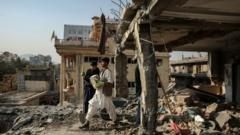Will the Taliban and Pakistan's Ceasefire Bring Lasting Peace?

Published: 2025-10-19 15:00:23 | Category: technology
The recent agreement for an immediate ceasefire between Pakistan and Afghanistan's Taliban government marks a significant step towards reducing hostilities that have plagued the region for over a week. Following intense clashes that resulted in heavy casualties on both sides, mediators from Qatar and Turkey facilitated talks that led to this pivotal moment. The Taliban has committed to not supporting groups that attack Pakistan, while both parties have agreed to protect civilians and refrain from further military actions.
Last updated: 17 October 2023 (BST)
Key Takeaways
- Ceasefire agreed after more than a week of fighting.
- Both sides claim heavy casualties during the clashes.
- The Taliban pledges not to support groups attacking Pakistan.
- Further talks are scheduled to take place in Istanbul.
- UN reports at least three dozen Afghan civilian casualties.
Background of the Conflict
Relations between Pakistan and the Taliban have been fraught with tension, particularly since the Taliban regained power in August 2021. Islamabad has long accused the Taliban of harbouring the Tehrik-i-Taliban Pakistan (TTP), a militant group that has orchestrated numerous attacks against Pakistani security forces. Despite these allegations, the Taliban has consistently denied any involvement in cross-border insurgencies.
The Recent Clashes
The recent escalation began when the Taliban accused Pakistan of launching attacks on Kabul, resulting in a series of retaliatory strikes. The situation worsened as Afghan troops fired upon Pakistani border posts, prompting Pakistan to respond with drone strikes and mortars. This cycle of violence culminated in a devastating toll, with the UN Assistance Mission in Afghanistan reporting significant civilian casualties.
Details of the Ceasefire Agreement
The ceasefire agreement was brokered as part of talks held in Doha, Qatar, with both sides recognising the importance of establishing mechanisms for lasting peace. The Taliban's spokesman, Zabihullah Mujahid, emphasised that ending hostilities was crucial for stability in the region. Pakistan’s Foreign Minister hailed the agreement as a positive development, framing it as the first step toward a more peaceful coexistence.
Implications for Regional Security
The ceasefire carries significant implications for regional security. With the Taliban committing to halt support for groups that target Pakistan, there is potential for improved relations if both parties adhere to the terms. However, skepticism remains, especially given the historical context of Pakistan's support for the Taliban following its ousting in 2001 and the subsequent deterioration of relations.
The Role of Mediation
Qatar and Turkey played critical roles in mediating the talks. Their involvement highlights the growing importance of diplomatic channels in addressing conflicts between Afghanistan and Pakistan. The outcome of these negotiations could influence broader regional dynamics, potentially encouraging other nations to engage in similar diplomatic efforts.
What Happens Next?
As both governments prepare for further discussions in Istanbul, the international community will be watching closely. The success of the ceasefire will depend on the commitment of both sides to uphold the agreement and engage in constructive dialogue. The coming weeks will be crucial in determining whether this ceasefire can transition into a more stable and lasting peace.
Humanitarian Impact
The ongoing clashes have had a devastating humanitarian impact, particularly on Afghan civilians. With the UN reporting numerous casualties, including women and children, the need for immediate humanitarian assistance is pressing. As the ceasefire holds, there is hope that aid can be delivered to those in need, mitigating the effects of the violence.
Conclusion
The agreement for an immediate ceasefire between Pakistan and the Taliban is a pivotal moment in a long-standing conflict. While it offers a glimmer of hope for peace, the challenges ahead are significant. The commitment of both sides to adhere to the ceasefire will be crucial in determining whether this agreement leads to a more stable and secure future for the region. As the situation evolves, the international community must remain engaged and supportive of peaceful resolutions.
FAQs
What caused the recent clashes between Pakistan and the Taliban?
The clashes were sparked by accusations from the Taliban that Pakistan conducted attacks on Kabul, leading to retaliatory fire from both sides along their shared border.
How many casualties have been reported due to the fighting?
The UN Assistance Mission in Afghanistan reports that at least three dozen Afghan civilians have been killed, with hundreds more wounded during the recent hostilities.
What is the significance of the ceasefire agreement?
The ceasefire marks a critical step towards reducing violence and establishing a framework for future peace talks between Pakistan and the Taliban, potentially stabilising the region.
What are the next steps following the ceasefire?
Further talks are scheduled to take place in Istanbul, where both sides will discuss mechanisms to consolidate peace and address underlying issues that have led to conflict.
How has the international community reacted to the ceasefire?
The international community is cautiously optimistic, viewing the ceasefire as a positive development that may lead to improved relations and stability in the region.



